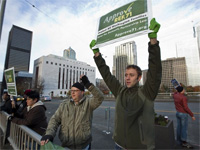Athletes, Coach humiliated at public interrogation about sexual orientation
Today, National Center for Lesbian Rights (NCLR) clients and the law firm of K&L Gates LLP filed a lawsuit in the United States District Court for the Western District of Washington challenging the discriminatory practices of the North American Gay Amateur Athletic Association (NAGAAA). The lawsuit alleges that NAGAAA violated Washington’s laws governing discrimination in public accommodations, and state consumer protections by implementing and enforcing a “two heterosexuals per team” cap during the 2008 Gay Softball World Series in Seattle, and also violated the plaintiff softball players’ rights by subjecting them to a series of invasive questions about their sexual orientation and private lives in front of more than 25 people, most of them strangers.
When NCLR clients Steven Apilado, LaRon Charles, and Jon Russ traveled with their softball team to the 2008 Gay Softball World Series in Seattle, they encountered discrimination, hostility, and suspicion. Their team, D2, had been playing together in the San Francisco Gay Softball League for years. In 2008, they had practiced more than ever in the hopes of winning the World Series, and they made it all the way to the championship game.
During the championship, D2 learned that another team challenged their eligibility to play based on a tournament rule that each team could have no more than two straight players. Immediately after the game, five D2 players were summoned to a conference room for a protest hearing, despite NAGAAA’s stated mission of promoting “amateur sports competition, particularly softball, for all persons regardless of age, sexual orientation or preference, with special emphasis on the participation of members of the gay, lesbian, bisexual and transgender community.” Each player was forced to answer intrusive questions about his sexual orientation and his private life in front of a room of over 25 people, most of whom the players did not know. The players were forced to answer whether they were “predominantly attracted to men” or “predominantly attracted to women,” without the option of answering that they were attracted to both. After each player was interrogated, a panel voted on whether he was “gay” or “non-gay.” NAGAAA’s committee refused to entertain the idea that the players could be bisexual. In response to a player’s statement that he was attracted to both men and women, a NAGAAA member responded, “This is the Gay World Series, not the Bisexual World Series.”
Ultimately, the predominantly-white committee voted that Charles, Russ, and Apilado, all men of color, were not gay. The committee voted multiple times on at least one player. The committee also declared that the other two players, both white—one of whom had given precisely the same answers as Russ—were gay. The committee recommended disciplinary measures against Apilado, Charles, and Russ their team, and the San Francisco Gay Softball League, including forcing their team, D2, to retroactively forfeit their second-place World Series win.
“This case shows that bisexual people are an integral part of the lesbian, gay, bisexual, and transgender community. The San Francisco team was truly diverse and welcomed bisexual, gay, and straight players, and they saw each other as not just teammates, but family,” said NCLR Sports Project Director Helen Carroll. “We all deserve to be treated with respect no matter what part of the ‘LGBT’ we are. It damages our community to conduct witch hunts and to exclude people from playing in a sports league for not being ‘gay enough’. We wouldn’t accept this kind of treatment from a non-LGBT sports organization and we shouldn’t do it to ourselves.”
NAGAAA, which organizes the Gay Softball World Series, has refused to change the discriminatory rule that excludes players based on sexual orientation, to apologize to Apilado, Charles, and Russ for the traumatic and humiliating public interrogation they endured, or to disavow the practice of interrogating players about their sexual orientations in protest hearings.
NCLR Staff Attorney Melanie Rowen said, “Washington law prohibits discrimination based on sexual orientation in public accommodations. But conducting an inquisition into someone’s sexual orientation to exclude them from playing sports in their community is not just discriminatory—it is outrageous.”
“When you play softball, you never expect for anyone to corner you and ask you personal questions about who you are and what you do,” said Charles. “It was emotional for me as a coach to go in there and not only get grilled, but watch my team be put in this situation. This had me angry, had me in tears, contemplating whether I even want to be part of the league anymore after being in it since 1999. The rationale that straight players should be limited on a team because they are better athletes is wrong, and it’s insulting to the many strong LGBT athletes of today. A player is a player.”
Apilado, Charles, and Russ are represented pro bono by NCLR and Suzanne J. Thomas and Cristin J. Kent of K&L Gates.



 Posted by nclrights
Posted by nclrights 